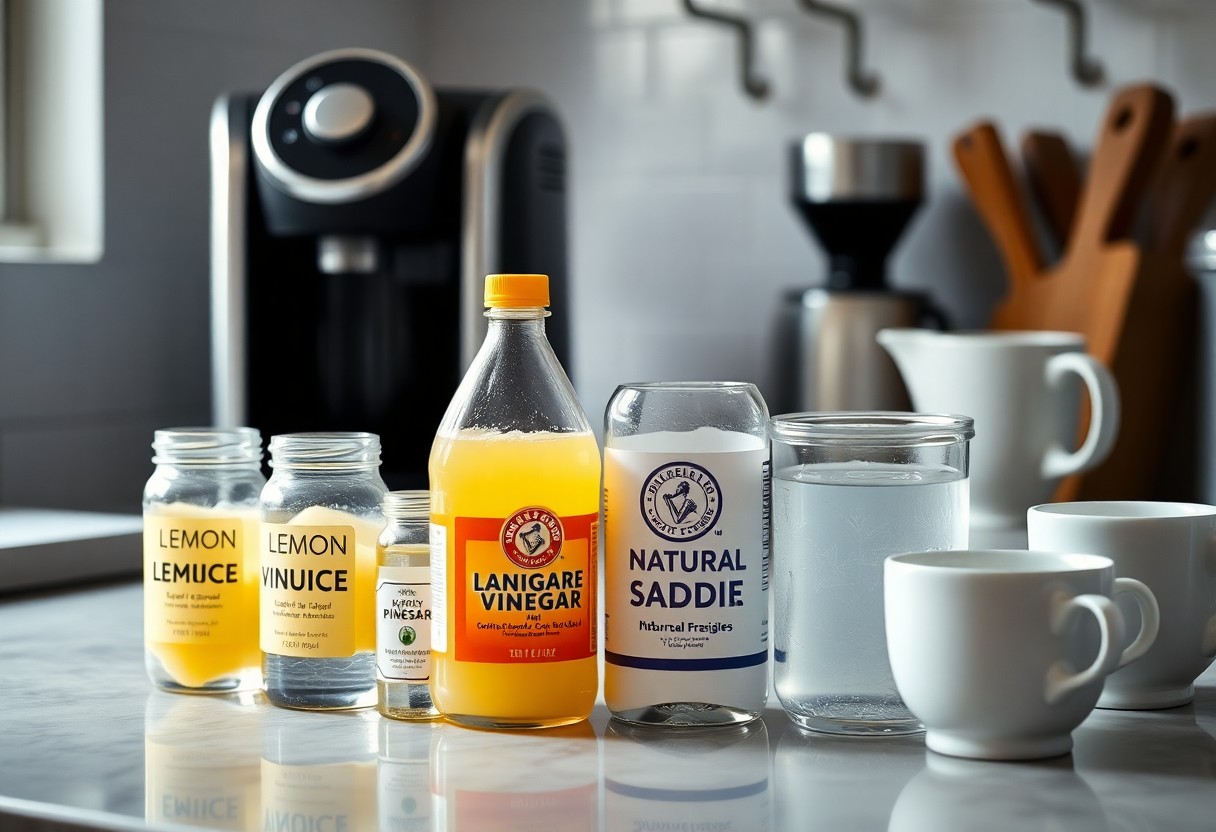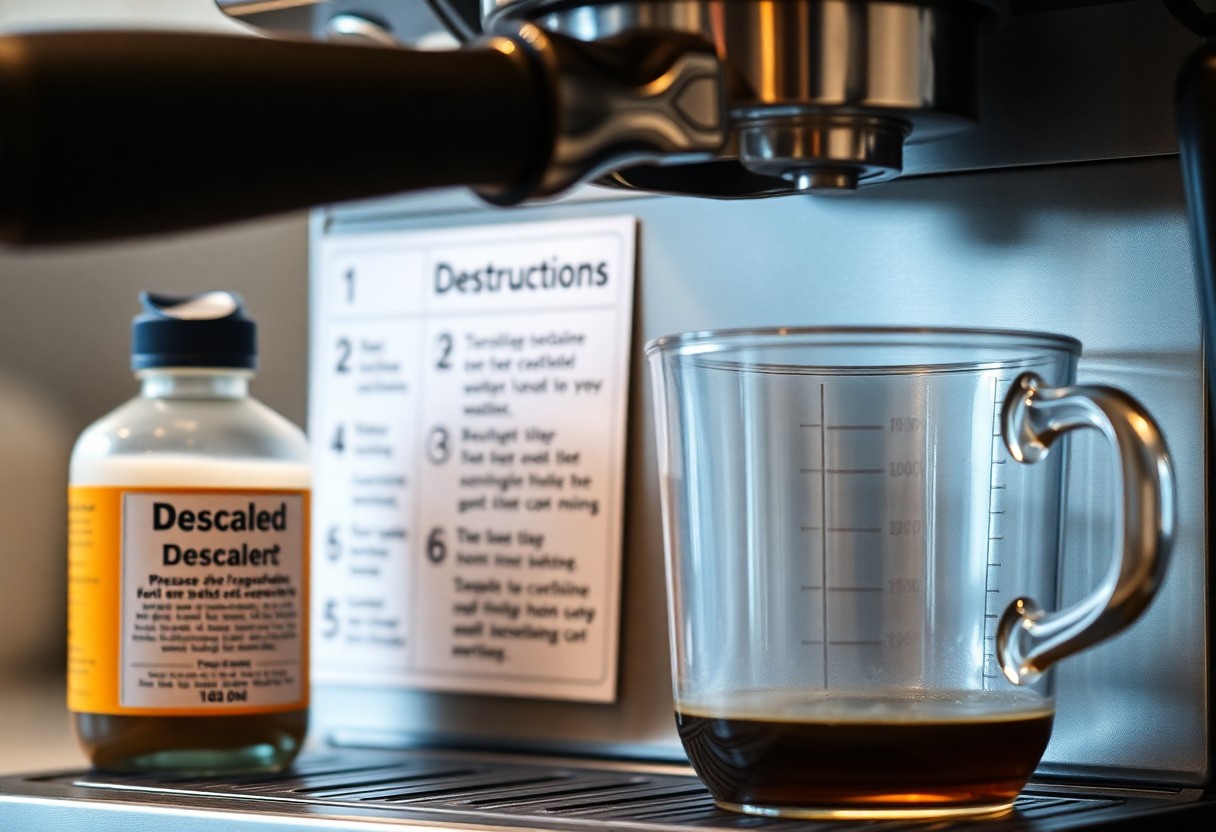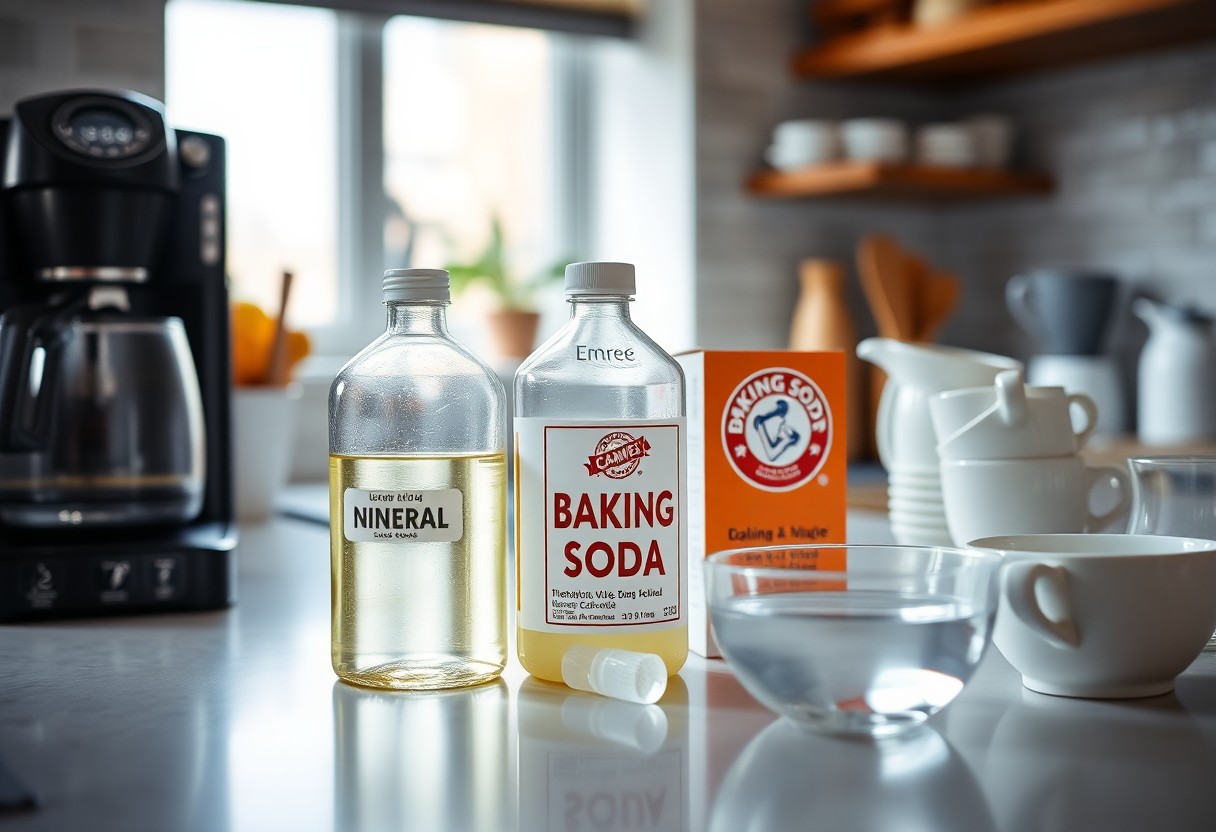What to Descale a Coffee Machine With – Descaling Agents
Just as you enjoy your daily cup of coffee, it’s imperative to maintain your coffee machine for the best flavor and functionality. Using effective descaling agents is key to removing mineral buildup, which can affect performance and taste. You have several options, including commercial descalers, vinegar, and citric acid. Each agent comes with its benefits and potential downsides, so understanding what works best for your machine can enhance its longevity and your coffee experience. In this post, we’ll explore the best descaling agents to keep your coffee machine in top shape.
Key Takeaways:
- Common descaling agents include white vinegar, citric acid, and commercially available descaling solutions specifically formulated for coffee machines.
- White vinegar is an effective, natural option for descaling; however, it may leave a lingering odor that requires additional rinsing.
- Citric acid is a non-toxic and biodegradable option that not only descalers but also helps enhance the flavor of the coffee.
- Always follow the manufacturer’s instructions for descaling products to avoid damaging your coffee machine.
- Regular descaling every few months can improve the longevity and performance of your coffee machine.
The Chemistry of Descaling: What Happens to Your Coffee Machine?
Descaling involves chemical processes that break down mineral deposits and restore your coffee machine’s functionality. When you introduce descaling agents, they interact with the building minerals like calcium carbonate, converting them into soluble compounds. This reaction allows them to be easily flushed away, preventing your machine from experiencing prolonged damage due to scale buildup.
Understanding Mineral Buildup
Mineral buildup occurs when water heats up during brewing, causing dissolved minerals to solidify and cling to internal components. As tap water often contains high levels of calcium and magnesium, over time, these minerals accumulate, forming deposits commonly known as scale. Regular descaling helps maintain optimal water flow and temperature regulation in your machine.
The Impact of Scale on Performance
Scale adversely affects your coffee machine’s efficiency and quality of brew. When scale formations occur, they can clog water pathways, reducing flow rate and brewing temperature. This results in suboptimal extraction of the coffee oils and flavors you enjoy, leading to a disappointing cup of coffee. If not addressed, scale can cause wear and tear on heating elements and other critical components, potentially resulting in costly repairs or replacements.
In fact, even a thick layer of scale can increase brew times by up to 30%, leading to frustration during your morning routine. The decreased thermal conductivity caused by these deposits means that your coffee may not reach the ideal brewing temperature, adversely affecting the flavor profile. Keeping your machine free of scale not only ensures better-tasting coffee but also prolongs the life of your appliance, making regular descaling a worthwhile investment for any coffee lover.

Popular Natural Descaling Agents: Pros and Cons
| Descaling Agent | Pros and Cons |
|---|---|
| Vinegar | Pro: Inexpensive; Con: Strong odor that may linger. |
| Citric Acid | Pro: Effective and pleasant smell; Con: May not be readily available. |
| Baking Soda | Pro: Gentle on machines; Con: Less effective against heavy buildup. |
| Apple Cider Vinegar | Pro: Mildly acidic with added flavor; Con: Not as potent as white vinegar. |
| Water Softener Salt | Pro: Specifically designed to combat hard water; Con: Can be rudimentary without additives. |
| Lemon Juice | Pro: Fresh scent and edible; Con: Acid concentration may vary. |
| Hydrogen Peroxide | Pro: Great for disinfecting; Con: Must be used cautiously to avoid machine damage. |
| Commercial Solutions | Pro: Tailored for coffee machines; Con: Pricey compared to natural options. |
| CLR (Calcium, Lime and Rust remover) | Pro: Powerful against tough scale; Con: Can be too harsh for some machines. |
| Tap Water | Pro: Readily available; Con: Can contribute to mineral buildup over time. |
Vinegar: A Household Staple with Pitfalls
Using vinegar for descaling is popular due to its low cost and accessibility. While effective in dissolving limescale, the strong odor can linger in your coffee machine, impacting the flavor of your brews. Additionally, some machines may be sensitive to vinegar’s acidity and could suffer damage over time.
Citric Acid: The Flavor Favorable Alternative
Citric acid stands out for its pleasant aroma and ability to effectively dissolve mineral buildup. This organic acid, found naturally in citrus fruits, makes it a safer option compared to harsher chemicals. It not only tackles limescale but also contributes to a fresher taste in your coffee. You’ll find that citric acid is easy to source, often available at grocery or health food stores in powdered form.
Baking Soda: A Gentle Yet Effective Choice
Baking soda is a gentle alternative for descaling thanks to its mild acidity and cleansing properties. Its natural ability to promote alkalinity can help balance acidic buildup, making it an effective choice for routine maintenance without risking damage to delicate coffee machines.
While baking soda may not remove heavy mineral deposits as quickly as other agents, its non-abrasive nature ensures that your machine stays in good condition, minimizing wear and tear. Regular use allows for ongoing maintenance, and you can easily mix it with water to create a simple yet effective cleaning solution for your equipment.
Commercial Descaling Solutions: An All-in-One Approach
For businesses that rely on coffee machines, commercial descaling solutions provide an efficient and comprehensive method to tackle mineral buildup. These products are designed to address the unique challenges faced by high-volume machines, ensuring consistent performance and extending equipment lifespan. Their formulation typically combines several active ingredients that work synergistically to dissolve limescale and other mineral deposits, making them a go-to choice for café owners and office managers alike.
Branding and Effectiveness
Many brands offer commercial descaling solutions, and effectiveness often varies by manufacturer. Leading products are usually backed by research and rigorous testing, ensuring they deliver real results. Carefully examine customer reviews and case studies to assess effectiveness, as a well-regarded brand can greatly enhance your maintenance routine and minimize downtime.
Safety and Environmental Considerations
Your choice of descaling solution may impact both safety and the environment. Many commercial products maintain a balance between strong efficacy and user safety, often being non-toxic and biodegradable. Prioritize solutions that are eco-friendly, reducing your establishment’s carbon footprint while ensuring a safe environment for both staff and customers.
In selecting a descaling agent, pay attention to certifications and ingredient transparency. Products that display eco-labels, such as Green Seal or Environmental Choice, indicate responsible manufacturing practices. Ensure that safety data sheets are available, providing crucial information about handling and emergency procedures. Using safer formulations not only protects your employees from chemical exposure but also aligns your business with sustainability goals, promoting a greener image to your customers.

Step-by-Step Descaling Process: Your Guide to Maintenance
The descaling process is important to keep your coffee machine performing at its best. Follow this step-by-step guide to ensure your machine remains in excellent condition.
Steps to Descale Your Coffee Machine
| 1. Prepare Your Machine | Gather all necessary materials, including descaling solution and water. |
| 2. Mix the Solution | Follow the instructions on your descaling agent for the correct dilution. |
| 3. Run the Descaling Cycle | Start the descaling process according to your machine’s guidelines. |
| 4. Rinse and Clean | Flush the machine with clean water to remove any residue. |
Preparing Your Machine for Descaling
Before beginning the descaling process, ensure your coffee machine is unplugged and completely cooled down. Empty the water reservoir and remove any coffee grounds from the filter and brew basket. This will prevent any contamination during the descaling process. Have your How to Descale Coffee Machines for Optimal Performance materials ready at hand for an efficient operation.
The Descaling Procedure: Timing and Tips
Timing is important for effective descaling. Follow the manufacturer’s suggested duration for running the descaling solution through your machine, usually ranging between 15 to 30 minutes. Keep in mind that some machines have automatic cycles, while others may require you to manually trigger the process. Adjust accordingly to ensure thorough cleansing of internal components. Regular maintenance, ideally every three months, can drastically improve your machine’s lifespan.
- Follow the manufacturer’s instructions for timing and activation.
- Monitor the descaling progress during the cycle.
- Consider using filtered water for rinsing after descaling.
- Document your descaling schedule to maintain regular upkeep.
Ensure the descaling solution is fully dissolved to minimize the risk of residue buildup. After running the cycle, follow up with one or two cycles of plain water to eliminate any remaining descaling agent. Be cautious with the types of descaling solutions used, as varying agents have recommended frequencies that differ from the standard. Assume that consistent maintenance is key to preventing limescale accumulation and prolonging the life of your coffee machine.
- Regular descaling reduces build-up for optimal coffee flavor.
- Follow up with water cycles to flush all residues.
- Adjust frequency based on usage for peak performance.
- Invest in quality descaling solutions for best results.
Timing and attention to detail during the descaling procedure are vital for maintaining your coffee machine’s health. Frequent observations during this process allow you to notice signs of limescale build-up and take action before it affects your coffee quality. Assume that with proper care, your coffee machine can remain an exceptional investment that serves delicious brews for years to come.
The Cost of Neglect: Long-term Implications of Not Descaling
Ignoring the descaling process can lead to significant long-term ramifications for your coffee machine. Over time, mineral buildup can severely impact performance, resulting in slower brewing times and inconsistent temperatures. This deterioration not only decreases the quality of your coffee but also places additional strain on internal components, leading to more frequent breakdowns or even complete failure. In extreme cases, neglect can void warranties, imposing expensive replacements or repairs that could have been easily avoided.
From Flavor to Functionality: The Ripple Effect
As mineral deposits accumulate, your coffee’s flavor suffers, resulting in bitter or sour notes that overpower the intended taste profile. This change can discourage even the most dedicated coffee enthusiasts from enjoying their favorite brews. Beyond flavor, build-up hinders your machine’s functionality, requiring longer brew times and cold spots during extraction, ultimately ruining your morning ritual.
Warranty Considerations and Manufacturer Guidelines
Many manufacturers stipulate that regular maintenance, including descaling, is important for keeping warranties intact. Failing to follow these guidelines can lead to costly repairs that aren’t covered. Additionally, if your machine is regularly ignored in terms of maintenance, any subsequent issues might be traced back to neglect, leaving you with the bill.
Adhering to your coffee machine’s warranty guidelines is key for safeguarding against unexpected costs. Typically, manufacturers outline specific maintenance routines in the user manual, detailing how often you should descale based on usage and water hardness. For instance, some machines recommend descaling every three months, while others may extend that timeline if you use filtered water. Keep in mind that failing to adhere to these recommendations not only jeopardizes your warranty but can also lead to irreversible damage to your machine, burdening you with potential repair or replacement costs as high as several hundred dollars.
Final Words
On the whole, selecting the right descaling agent for your coffee machine is necessary for maintaining its performance and prolonging its lifespan. Whether you opt for commercial descaler solutions, vinegar, or citric acid, each agent possesses unique properties that effectively combat mineral buildup. You should ensure you follow the manufacturer’s guidelines and suggestions tailored to your specific model. By regularly descaling your machine, you enhance your coffee’s taste and ensure a seamless brewing experience.
FAQ
Q: What are the most common descaling agents used for coffee machines?
A: The most common descaling agents include citric acid, white vinegar, and commercial descaling solutions specifically designed for coffee machines. Each agent has different properties: citric acid is a natural solution that is effective and eco-friendly, white vinegar is widely available and a cost-effective choice, while commercial solutions are often formulated to quickly remove limescale and are safe for most machines.
Q: Can I use vinegar to descale my coffee machine?
A: Yes, vinegar can be used to descale your coffee machine. However, it is important to dilute it with water to avoid potential damage to the machine’s components. A common ratio is one part vinegar to two parts water. After running the vinegar solution through the machine, it is crucial to run multiple cycles of clean water to remove any vinegar residue and odor.
Q: Is citric acid a safe option for descaling my coffee machine?
A: Citric acid is a safe option for descaling most coffee machines. It effectively dissolves limescale and is less aggressive than vinegar, which can be beneficial for certain machines. To use, mix about 1 to 2 tablespoons of citric acid with a liter of water, and run the solution through the machine. Just like with other descaling methods, follow up with clean water cycles to flush out any remaining citric acid.
Q: Are commercial descaling solutions worth the investment?
A: Yes, commercial descaling solutions can be worth the investment, particularly for those who want a quick and effective way to descale their coffee machines. These solutions are specifically formulated to target limescale buildup and often come with clear instructions for use. They tend to be gentle on machine components while being highly effective, making them a convenient choice for regular maintenance.
Q: How often should I descale my coffee machine with these agents?
A: The frequency of descaling will depend on factors such as the hardness of your water and how often you use the coffee machine. Generally, it is recommended to descale every 1 to 3 months. If you use hard water, you may need to descale more frequently. Some machines come equipped with alerts that inform you when it’s time to descale, ensuring optimal performance and longevity.







